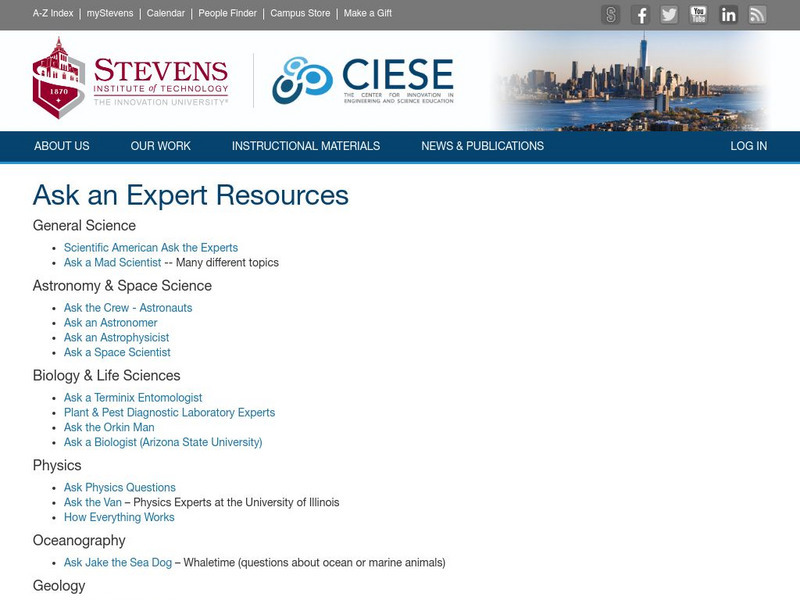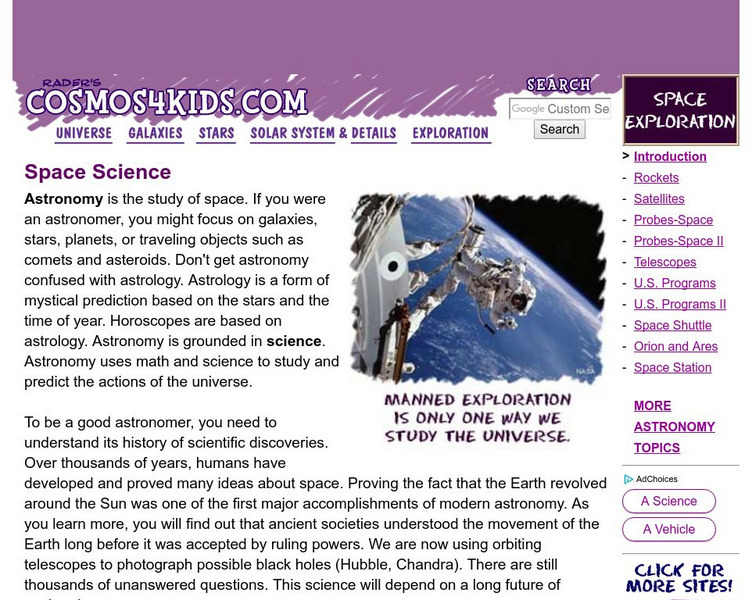Hi, what do you want to do?
Weber State University
The Sun and the Seasons
Why is there more daylight in June than in December if you live above the equator? How does the angle of sunlight shift throughout the year? Answer these questions and more with an interactive article about the sun, its path through the...
NASA
Nasa: Image Science Center: Ask the Space Scientist
A NASA scientist, Dr. Sten Odenwald, answers many students' questions. Topics include planets, galaxies, black holes, the origin of the universe, and common misconceptions about space.
Smithsonian Institution
National Air and Space Museum: Exploring the Planets: Ancient Times & the Greeks
In ancient times only five planets were known: Mercury, Venus, Mars, Jupiter, and Saturn. Learn about Greek astronomer Ptolemy's theory for the solar system that was to survive for fourteen centuries.
Center for Innovation in Engineering and Science Education, Stevens Institute of Technology
Ciese: Educational Links: Ask an Expert Sites
Ever wondered about, well, anything? Get your burning question answered here from reigning experts in General Science, Astronomy and Space Science, Biology and Life Sciences, Physics, Oceanography, Geology, Weather, and Health.
Ducksters
Ducksters: Astronomy for Kids: Space Exploration Timeline
Kids learn about the timeline of the history of space exploration including early astronomy, astronauts, spacecraft, planets, and the Moon.
NASA
Nasa: Mission: Science: Electromagnetic Spectrum: Infrared Waves
Infrared light lies between the visible and microwave portions of the electromagnetic spectrum. Infrared light has a range of wavelengths, just like visible light has wavelengths that range from red light to violet.
Cool Math
Coolmath: Science Monster: Introduction to Our Solar System
Find out about all the planets and other solar system characteristics in this colorful, illustrated tutorial on our neighborhood in space.
Cosmos 4 kids
Cosmos4 kids.com: Exploration
Space can be explored in many different ways. Read about space exploration and click on the topics on the right margin to find out how man finds out about his universe.
Ducksters
Ducksters: Astronomy for Kids: Astronauts
Kids learn about the astronauts who travel and explore outer space including spacesuits, fun facts, and famous adventurers like Buzz Aldrin, Yuri Gagarin, and Sally Ride.
National High Magnetic Field Laboratory
Magnet Academy: John Daniel Kraus
For a man whose career involved the entire known universe, John Kraus had a remarkably insular upbringing. He was born and raised in Ann Arbor, Michigan, and earned his bachelor's, master's and doctoral degrees in physics, all at the...














